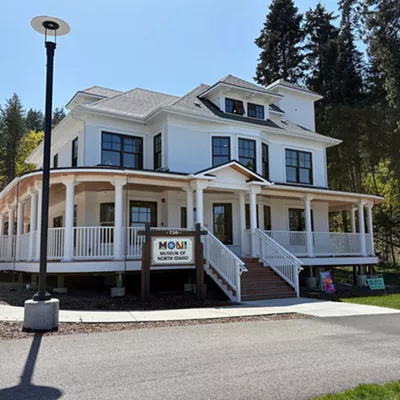Almost everyone sings. In the shower, in the car, even occasionally in public. There are groups of friends who get together just to harmonize, or work through a little four-part writing, and there are members of large ensembles who become friends while working though the masterpieces of choral music. From churches to festivals and orchestra choirs, people everywhere gather to raise their voices joyfully in song.
That's why it's surprising to discover that there is only one independent, full-time classical vocal ensemble in the United States. Since its founding, more than 75 men have sung in the all-male vocal ensemble named Chanticleer, after a character in Chaucer's Canterbury Tales. The group has released 23 recordings, won Grammy awards and commissioned new works from a number of composers. On Wednesday night, the Spokane Symphony will be sponsoring a performance of the ensemble in Spokane at St. Aloysius Church.
Where Chanticleer is now, however, is far from its origins at a dining table in San Francisco 25 years ago. Started by Louis Botto in 1978 with the intention of performing medieval and Renaissance music (much of which originally used only men's voices), the ensemble quickly gained popularity. Within a few years, the group was touring around the United States, and shortly thereafter was performing internationally and able to support its members as full-time employees.
"One hundred percent of their time is dedicated to Chanticleer," explains President and General Director Christine Bullin about the ensemble's 12 members. "It's a full-time, 12-month contract which was made possible around 1991. They took that leap and went full time. Because there are so many demands on Chanticleer, a singer in Chanticleer doesn't really have time for anything else."
The result of forming an independent, financially stable organization has resulted in Chanticleer attracting and maintaining some of the highest-caliber singers performing in America. Moreover, with only 12 positions, Bullin says, the competition to join the ensemble can initially be intense. But true to the organization's philosophy, the actual audition process is unique and designed to bring out an individual singer's strengths comfortably.
"You send in a tape," says Bullin, "and if our music director, Joseph Jennings, likes it, you are asked to come here to audition. And it's an interesting audition, because not only are you asked to sing by yourself, but you also spend a couple days rotating in and out of the ensemble.
"Now we're getting people auditioning who have known Chanticleer since they were very little, and have dreamed of being part of Chanticleer. So that's very nice to see."
The high-quality, changing voices of the ensemble, however, always ensure that the music is superbly performed. Chanticleer still sings plenty of medieval and Renaissance music, notes Bullin. "They've never moved away from it in the sense that it's still there, we still do it, we still record it, it's still a basic part of our artistic life. But within a couple of years of the ensemble's founding, they started commissioning music, which is something they always wanted to do. Then, within a few years, they added gospel as part of the regular repertoire."
Now, with award-winning albums dedicated to a diversity of styles ranging from contemporary music to Mexican Baroque, each Chanticleer performance highlights the group's diverse tastes.
"I think they've found a very successful way of addressing the public," Bullin says. "When they go on tour, there are some places they go every year, and others that they go every other year, so there are a lot of people waiting to hear the basic Chanticleer repertoire. So normally, on the road, they will display a little bit of everything. But in recent years, there has been more commissioning of new music. And their American program, 'Our American Journey,' was put together for the 25th anniversary season."
That program has already resulted in rave reviews from the New York Times and a bestseller position in Billboard magazine's classical chart. However, as Bullin observes, it isn't the group's status as a financially successful arts organization or even the technical abilities of the singers that makes audiences passionate about Chanticleer.
"The mission, as it is stated around here, is to realize the transcendent power of choral art. And I think the focus is very much on excellence in choral music in choral singing. That always has been and always will be it. And we do a lot of education to that effect to encourage people to sing. But the basic aesthetic value has to do with the singing itself, and how powerful and joyful that is."
Publication date: 02/06/03
















